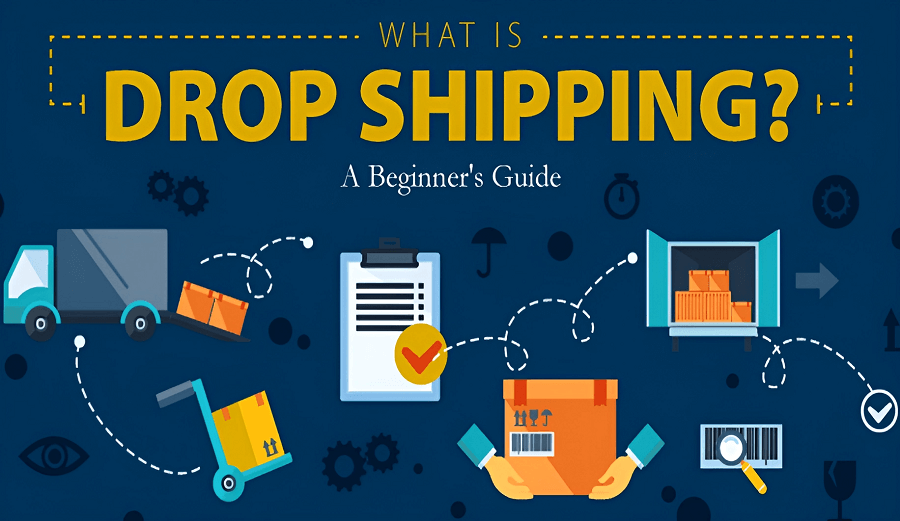In this post, I’d like to discuss the experience of my friend on how to create a successful online dropship business that has over $900,000 in sales in the last year.

First, let’s review dropshipping and its benefits and drawbacks.
What is dropshipping?
With the dropshipping business model, we don’t need to maintain inventory and produce the items ourselves. Easy as:
- We can set up an online store and collect money with the help of an E-commerce platform.
- The manufacturer is responsible for both manufacturing and delivery.
- We just provide sales and customer service.
Primary dropshipped products are clothes, shoes, hats, mugs, handicrafts…

Advantages of dropshipping business:
- Low startup costs: Dropshipping does not require the need for inventory reducing upfront expenses.
- Diversity product selection: With Dropshipping, you can provide a variety of products without stocking them.
- Flexibility and convenience: Run your business from anywhere, anytime via internet.
- Scalability: Easily add new products or expand into different markets to scale your business.
- Reduced risk: There is no risk of unsold products because you don’t have to purchase inventory in advance.
Drawbacks of dropshipping business:
- Limited authority over product quality and shipping process.
- High competition and potential risk of market saturation.
- Dependence on suppliers and their ability to fulfill orders timely.
- Difficulty in creating a strong brand identity and customer loyalty.
- Potential for inventory problems and out-of-stock.
- Challenges with customer service and returns due to longer shipping times.
- Profits can be low, especially when including advertising costs.

Below, I will help you learn about the steps to be a successful dropship business:
1. Select suitable dropship niche:
The first step in starting a dropshipping business is choosing an appealing market that brings significant profits. Seek for products with less competition but higher demand. To identify a niche that fits with your goals, consider your passions or expertise, conduct market research, and evaluate trends.
Advice: To assess product demand and competitive levels, analyze internet marketplaces and use keyword research tools.
Tips to find dropshipping niche:
- Perform market research to determine which products are popular and trending
- Analyze competitor stores to identify market gaps.
- Seek specialized products that have passionate potential customers
- Evaluate profit margins and product demand.
- Assess the logistics of shipment and the availability of reputable providers.
- Concentrate on goods that might lead to upselling or recurring purchases.
- Try out different fields with small-scale campaigns or social media advertisements.
- Update regularly with industry changes and customer preferences.
- Prioritize product quality and customer satisfaction at all times.
2. Conduct Competitor Analysis
Most people make a mistake of not conducting research about their dropshipping rivals. However, you will find out the advantages and disadvantages of your rival using this method.
Tips to analyze competitor:
- Identify important competitors in your niche.
- Analyze their offerings and pricing strategies.
- Study their marketing methods and target customer.
- Supervise their customer reviews and feedback.
- Monitor their social media presence and interactions.
- Update with any new product releases or promotions they are doing.
You may get valuable information to guide your own dropshipping approach by following these guidelines.

3. Seek to reliable Suppliers
You can search for reputable product suppliers on the following platforms:
- AliExpress
- SaleHoo
- Worldwide Brands
- Doba
- Megagoods
- Wholesale Central

Tips to choose reliable supplier:
- Assess suppliers with a wide range of products
- Check carefully their shipping and delivery options
- Consider their reputation and customer reviews
- Evaluate their pricing and profit margins
- Make sure that they provide excellent customer service
- Check their return policies and guarantees
- Consider their industry experience
You might find a trustworthy provider who can fulfill your dropshipping requirements by carefully considering these factors.
4. Create an online Dropshipping store
Thankfully, with the development of e-commerce, everything has become easier. You can get assistance from the following platforms:
- Magento
- Shopify
- WooCommerce
- BigCommerce
- WIX
- Shift4Shop
- PrestaShop
- Squarespace

In order to create a website, you will need:
- A content management system such as Shopify, WordPress or Squarespace
- A domain name
- Web hosting (if using WordPress)
- Integrations with your chosen dropshippers
- A payment gateway integrated into the website to receive online payments
You may get a free domain name from websites like Shopify, Wix,… Creating a website on their platform is a simple procedure.
5. Shopify store platform
The second concern is that you have to get in touch with suppliers before posting products on your website.
Tips to promote your dropshipping business:
- Use social media platforms to show your products and interact with potential customers.
- Collaborate with influencers or bloggers in your field to improve your brand awareness.
- Set up competitive pricing and promotions in order o attract customers.
- Optimize your website by SEO tools to improve visibility and organic traffic.
- Provide excellent customer service to build trust and loyalty.
- Use email marketing campaigns to notify customers about upcoming sales and new products.
- Use Facebook Ads or Google Ads with targeted advertising to optimize your reach
6. Offer Excellent Customer Service:
Establishing excellent customer service is very critical for increasing business efficiency and reducing consumer complaints.
Some tips to enhance customer service in dropshipping business:
- Provide timely and accurate order tracking information.
- Offer multiple contact channels for customers to connect.
- Respond quickly to customer questions and concerns.
- Personalize interactions by using customer names.
- Offer proactive updates on shipping delays or issues.
- Implement a simple return and refund policy.
- Provide product informations and descriptions clearly.
- Offer promotions for loyal customers, such as discounts or exclusive offers.
7. Analyze Data and Optimize Performance:
To check the business status of your store, you must regularly analyze data. Include:
- Customer conversion rate.
- Average order value
- Value of website traffic sources.
- Customer response rate.
For further information, you can visit our website Betomon.




